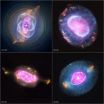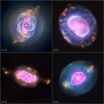(Press-News.org) From politics to finance, government to education, ethics-related scandals seem to crop up with considerable regularity. As whistleblowers and investigative journalists bring these scandals to light, one can't help but wonder: Are there specific character traits that predispose people to unethical behavior?
Converging evidence suggests that the answer could be guilt proneness.
In a new article in Current Directions in Psychological Science, a journal of the Association for Psychological Science, researchers Taya Cohen and Nazli Turan of Carnegie Mellon University and A.T. Panter of the University of North Carolina at Chapel Hill examine the existing research on guilt proneness, exploring how it might influence our behavior in the workplace and beyond.
According to Cohen, Panter, and Turan, guilt proneness isn't the same thing as feeling guilty after you've done something wrong – people who are guilt prone actually anticipate having negative feelings before they ever commit a moral transgression. Importantly, these people don't need their mother, their boss, or their significant other looking over their shoulder to prevent them from committing moral transgressions because their conscience does it for them.
Guilt proneness can be measured with four items, drawn from the Guilt and Shame Proneness scale (GASP), which ask people to imagine how they would feel in a given scenario. Although answers to the items vary across different groups of participants, the researchers estimate that about 30% to 40% of the adults they have surveyed are considered low in guilt proneness.
Not surprisingly, guilt proneness seems to be correlated with certain aspects of personality. Research suggests that people who are high in guilt proneness are more likely to be sympathetic, take the perspective of others, consider the future consequences of their behavior, and value having moral traits. Furthermore, women are more guilt prone than men, and older adults are more guilt prone than younger adults.
Across several studies, Cohen, Panter, and Turan have found that people who report higher levels of guilt proneness are less likely to make unethical business decisions, lie for monetary gain, or cheat during negotiations. People who are guilt prone are also less likely to engage in counterproductive work behaviors, like showing up to work late without permission, stealing office supplies, and being rude to clients, even after taking into account other factors like gender, age, and interpersonal conflict at work.
All of this research suggests that it may be wise to keep guilt proneness in mind, whether we are looking for an ethical friend, an ethical lover, or an ethical employee.
The guilt-proneness scale has the potential to be "an important measurement tool for predicting which individuals are likely to behave unethically in their social interactions inside and outside the workplace," Cohen and her colleagues write. The researchers encourage additional research to examine whether GASP might be a useful and valid tool in high-stakes settings such as personnel selection.
###
This publication was made possible through the support of the Center for Behavioral & Decision Research at Carnegie Mellon University, the Berkman Faculty Development Fund at Carnegie Mellon University, and Grant 15519 from The Character Project at Wake Forest University and the John Templeton Foundation to Taya R. Cohen and A. T. Panter. The opinions expressed in this publication are those of the authors and do not necessarily reflect the views of the sponsors.
For more information about this study, please contact: Taya R. Cohen at tcohen@cmu.edu.
Current Directions in Psychological Science, a journal of the Association for Psychological Science, publishes concise reviews on the latest advances in theory and research spanning all of scientific psychology and its applications. For a copy of "Guilt Proneness and Moral Character" and access to other Current Directions in Psychological Science research findings, please contact Anna Mikulak at 202-293-9300 or amikulak@psychologicalscience.org.
The good, the bad, and the guilty: Anticipating feelings of guilt predicts ethical behavior
2012-10-11
ELSE PRESS RELEASES FROM THIS DATE:
A planetary nebula gallery
2012-10-11
This gallery shows four planetary nebulas from the first systematic survey of such objects in the solar neighborhood made with NASA's Chandra X-ray Observatory. The planetary nebulas shown here are NGC 6543, also known as the Cat's Eye, NGC 7662, NGC 7009 and NGC 6826. In each case, X-ray emission from Chandra is colored purple and optical emission from the Hubble Space Telescope is colored red, green and blue.
In the first part of this survey, published in a new paper, twenty one planetary nebulas within about 5000 light years of the Earth have been observed. The paper ...
Grape consumption associated with healthier dietary patterns
2012-10-11
Sacramento, CA (October 9, 2012) – In a new observational study presented today at the Academy of Nutrition and Dietetics Food and Nutrition Conference and Exposition (FNCE) in Philadelphia, PA, researchers looked at the association of grape consumption, in the non-alcoholic forms most commonly consumed – fresh grapes, raisins and 100% grape juice – with the diet quality of a recent, nationally representative sample of U.S. children and adults. Their findings suggest that, among adults and children, consumption of grapes and grape products is associated with healthier dietary ...
Analysis finds likely voters rank health care second most important issue in presidential choice
2012-10-11
Boston, MA – A new analysis of 37 national opinion polls conducted by 17 survey organizations finds that health care is the second most important issue for likely voters in deciding their 2012 presidential vote. This is the highest that health care has been ranked as a presidential election issue since 1992. When likely voters were asked to choose from a list of issues, similar to the approach used in election-day exit polls, one in five (20%) named "health care and Medicare" as the most important issue in their 2012 voting choice, far behind "the economy and jobs" (cited ...
Cold cases heat up through Lawrence Livermore approach to identifying remains
2012-10-11
LIVERMORE, Calif. -- In an effort to identify the thousands of John/Jane Doe cold cases in the United States, a Lawrence Livermore National Laboratory researcher and a team of international collaborators have found a multidisciplinary approach to identifying the remains of missing persons.
Using "bomb pulse" radiocarbon analysis developed at Lawrence Livermore, combined with recently developed anthropological analysis and forensic DNA techniques, the researchers were able to identify the remains of a missing child 41 years after the discovery of the body.
In 1968, ...
Sweeping X-ray imaging survey of dying stars is 'uncharted territory'
2012-10-11
The death throes of dying stars are the focus of a sweeping new survey using NASA's Chandra X-ray satellite observatory.
More than two dozen astronomers have aligned their research goals to use Chandra to image a set of dying stars in the neighborhood of the Sun. The resulting X-ray images of these dying stars—called planetary nebulae—are shedding light on the violent "end game" of a Sun-like star's life.
The research team, led by Joel Kastner from Rochester Institute of Technology, won seven days of observing time with Chandra in 2011 to survey and image nearly two ...
Mount Sinai researchers discover gene signature that predicts prostate cancer survival
2012-10-11
Researchers from Mount Sinai School of Medicine have identified a six-gene signature that can be used in a test to predict survival in men with aggressive prostate cancer, according to new research published in the October issue of The Lancet Oncology. This is the first study to demonstrate how prognostic markers may be useful in a clinical setting.
Using blood from 202 men with treatment-resistant prostate cancer, researchers found six genes characteristic of treatment-resistant prostate cancer. Men with the six-gene signature were high-risk, with a survival time of ...
Scientists pinpoint gene variations linked to higher risk of bipolar disorder
2012-10-11
JUPITER, FL, October 10, 2012 – Scientists from the Florida campus of The Scripps Research Institute (TSRI) have identified small variations in a number of genes that are closely linked to an increased risk of bipolar disorder, a mental illness that affects nearly six million Americans, according to the National Institute of Mental Health.
"Using samples from some 3,400 individuals, we identified several new variants in genes closely associated with bipolar disorder," said Scripps Florida Professor Ron Davis, who led the new study, which was published recently by the ...
Study challenges assumptions on wartime sexual violence
2012-10-11
A new study by the Simon Fraser University-based Human Security Report Project (HSRP), released today at the United Nations headquarters in New York, finds that there is no compelling evidence to support a host of widely held beliefs regarding wartime sexual violence.
The study, presented by HSRP director Andrew Mack, disputes the common assumption that conflict-related sexual violence is on the rise, and argues that the experience of a small number of countries afflicted by extreme levels of sexual violence is not the norm for all war-affected countries.
Key findings ...
Palm oil massive source of carbon dioxide
2012-10-11
New Haven, Conn. -- Expanding production of palm oil, a common ingredient in processed foods, soaps and personal care products, is driving rainforest destruction and massive carbon dioxide emissions, according to a new study by Yale and Stanford researchers.
The study, published in the journal Nature Climate Change, shows that deforestation for the development of oil palm plantations in Indonesian Borneo is becoming a globally significant source of carbon dioxide emissions.
Plantation expansion is projected to pump more than 558 million metric tons of carbon dioxide ...
Checklists can effectively assess work-related risk of musculoskeletal injuries
2012-10-11
Amsterdam, NL, October 10, 2012 – A new paper by Thomas J. Albin, PE, CPE, of High Plains Engineering Services in Minneapolis, Minnesota, USA, confirms that observational assessment tools, often called checklists, used to assess risk factors such as wrist extension and motion repetition, can be valid tools in identifying work-related risk factors for musculoskeletal injuries. Published in Work: A Journal of Prevention, Assessment, and Rehabilitation, Albin presents a comprehensive, multi-step yet simple approach for improving the use and effectiveness of checklists.
Previous ...


